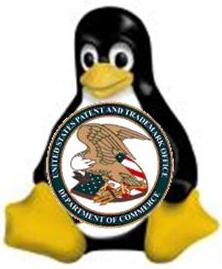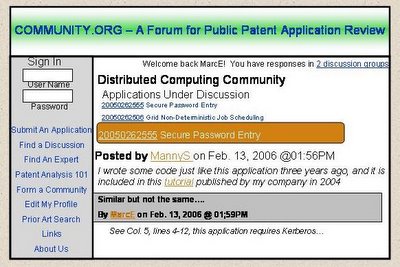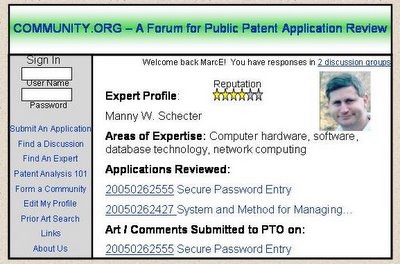Highlights of the USPTO's Open Source Software Community Meeting

Thanks to Peter Zura's Two-Seventy-One Patent Blog for pointing to Groklaw's extensive reports on the February 16, 2006 meeting at the USPTO on the prior art database and community review patent projects. The official agenda for the meeting is available here.
Among other things, the meeting included a presentation by Professor Beth Noveck, of New York Law School (and author of "A Democracy of Groups"), on consulting "the community jury as a proxy for a person having ordinary skill in the art." In her view,
Although she recognizes that her proposal for using "the wisdom of crowds" has been criticized as too radical, it nonetheless appears to already have the backing of Irving Wladawsky-Berger, Vice President of Technical Strategy and Innovation at IBM, who writes in his new blog that"The obviousness determination could be aided by a small group of relevant
experts acting as a consultative citizen jury to aid the Examiner. Members
of the expert community evaluate and rate each other's participation. The
patent Examiner coordinates the back an forth colloquy with the inventor.
- allow experts to self-assign participation based upon expertise an interest
- use reputation software to enable to community to rate its own experts
- use slides and other simple feedback tools to enable faster participation
- use visualization tools to build innovation maps"
"The community should assist in the evaluation of patent applications by providing as much information as possible to patent examiners on prior art that might support or invalidate an application, as well as feedback on the quality and merit of the application in question, as is the case with the Community Patent Initiative. The public should also have access to all pertinent information about the inventors and those actually applying for and holding the patent, whether it is the inventors themselves, a corporation, or an IP-only business that exists solely for the purpose of buying and licensing patents to the exclusion of actual production of any kind. A major step toward increased transparency was taken with the announcementsAccording to a presentation by Marc Erlich, Intellectual Property Counsel at IBM, what this really means is focussing on, access, review, and feedback during the patent examination process. In particular, Erlich sees the need for a simplified subscription-based e-mail alerting system (which most proactive attorneys have already implemented in one form or another). His new "platform for review of published applications" would provide "technology to simplify review" such as education on how to review patents, information on the reputation and background of experts ("based in part on history of results of prior art submitted to PTO"), and a discussion forum with "means to determine response to examiner, if any." Here are his intriguing examples:
we made earlier this year with the US Patent Office (USPTO), the Open Source Development Lab (OSDL) and others aimed at involving open communities and the public in general to help increase patent quality."


In order to keep the system from turning into mob rule for patents, Erlich also suggests structuring the comments from prior art submitters with a very narrow submission template:
 Presumably, a patent Examiner would then review this information before deciding whether to make it part of the record in the official file history. Of course, the devil is always in the details, and Erlich still sees the following "potential challenges:"
Presumably, a patent Examiner would then review this information before deciding whether to make it part of the record in the official file history. Of course, the devil is always in the details, and Erlich still sees the following "potential challenges:"
- flooding -- overburdening of examiner with redundant or irrelevant documents might be addressed with filtrering and reputation assessment software.
- gaming -- using submissions to intentionally delay issuance of another's patent
- rule-making -- rules may need to be changed in order to protect applicants during the examination process
- willfull infringement -- some forbid review of patent dicuments fearing charge of willful infringement that may require a risk v. reward balance after experience with the system

2 Comments:
Because IBM has an announced stake in this procedure, favorable comments from IBM have to viewed in that light.
Some comments on peer review appear at
http://ipbiz.blogspot.com/2006/01/peer-to-patent-project.html
http://ipbiz.blogspot.com/2006/02/some-points-on-benjamin-franklin.html
http://ipbiz.blogspot.com/2005/12/issues-of-peer-review-co-authorship.html
Lawrence B. Ebert
toms shoes outlet
louis vuitton outlet
oakley store
tods shoes
mont blanc pens
adidas nmd
gucci outlet
coach factory outlet
gucci outlet
christian louboutin paris
chenlina20160922
Post a Comment
<< Home
© 2004-2007 William F. Heinze